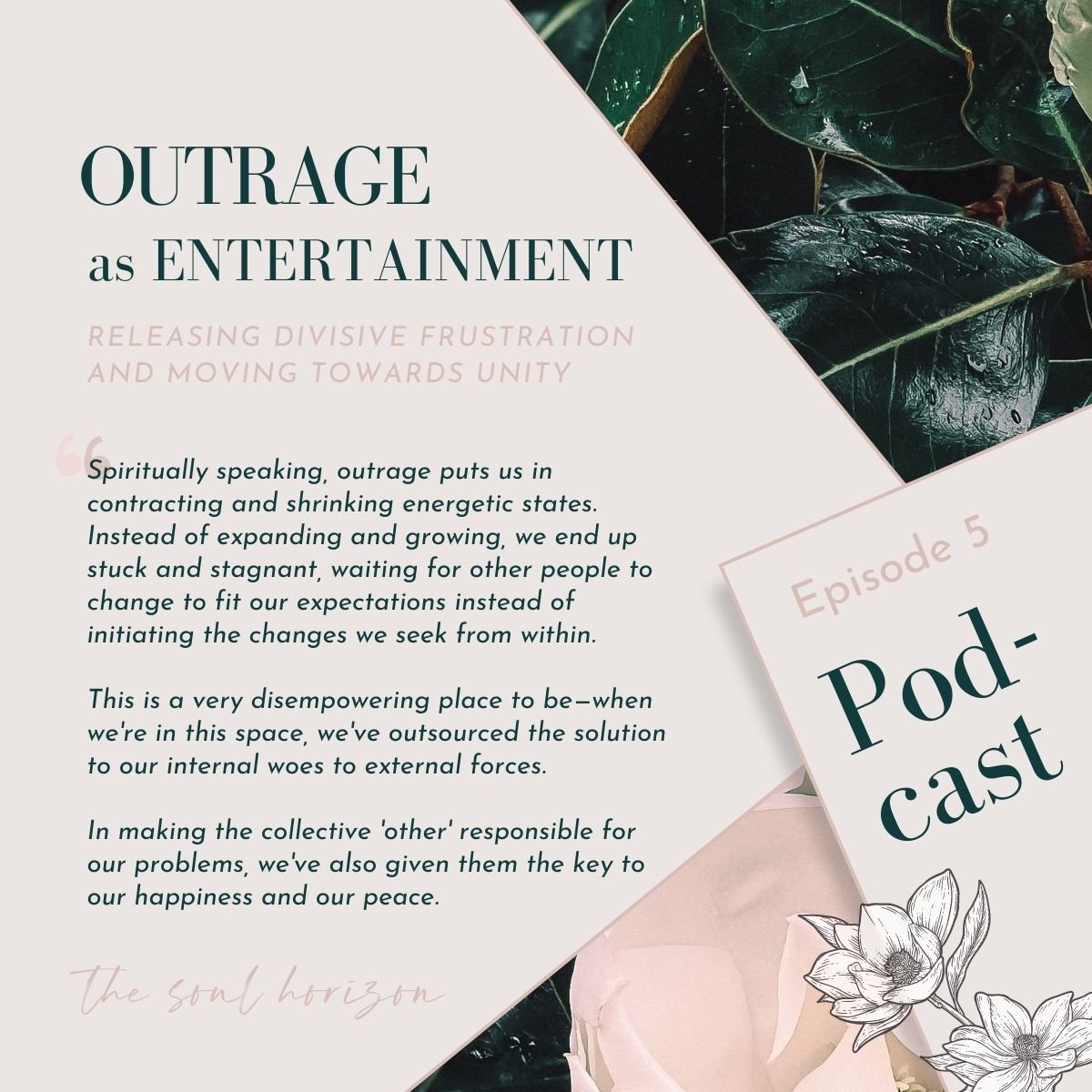Ep. 5: Outrage as Entertainment
SUBSCRIBE TO THE SOUL HORIZON: Apple Podcasts (iTunes) | Spotify | Amazon Music | iHeartRadio | Stitcher | Google Podcasts
In this modern world of endless social media scrolling and heightened divisions, have you ever found yourself looking for things to be angry about?
Perhaps you click into Twitter with the intention of seeing what the "other side" has to say fully expecting to get riled up about it? If so, you're not alone. Many of us have found ourselves caught in this "outrage as entertainment" cycle.
Are we addicted to outrage? What purpose does outrage serve?
Is this type of morally cloaked anger prosocial or are we merely feeding into a self-serving neurobiological brain loop when we go looking for injustices? What biases underpin our perceptions?
And what can we do to step out of the outrage cycle and into empathic, unifying awareness?
We address all of these questions and more in this episode.
If you've ever found yourself in a pattern of looking for things to be outraged by and you're curious as to why and what to do about it, give this one a listen.
SUPPORT THE SOUL HORIZON
Leave a 5-star rating or review for The Soul Horizon on iTunes
EPISODE SOURCES
Brown-Iannuzzi, J. L., Lundberg, K. B., Kay, A. C., & Payne, B. K. (2020). A Privileged Point of View: Effects of Subjective Socioeconomic Status on Naïve Realism and Political Division. Personality and Social Psychology Bulletin, 47(2), 241–256.
Chien, Y., Wegener, D., Petty, R., & Hsiao, C. (2014). The Flexible Correction Model: Bias Correction Guided by Naïve Theories of Bias. Social and Personality Psychology Compass, 8(6), 275-286.
Esses, V. M., Veenvliet, S., Hodson, G., & Mihic, L. (2008). Justice, morality, and the dehumanization of refugees. Social Justice Research, 21, 4–25.
Gilbert, D. T., Lieberman, M. D., Morewedge, C. K. & Wilson, T. D. (2004). The peculiar longevity of things not so bad. Psychological Science, 15(1), 14–19.
Hawkins, D. R. (2002). Power vs. force: The hidden determinants of human behavior. Carlsbad, Calif: Hay House.
Ito, T. A., Larsen, J. T., Smith, N. K., & Cacioppo, J. T. (1998). Negative information weighs more heavily on the brain: The negativity bias in evaluative categorizations. Journal of Personality and Social Psychology, 75(4), 887–900.
Lisitsa, E. (2012, December 3). The Positive Perspective: Dr. Gottman’s Magic Ratio! [blog post]. Retrieved from http://www.gottmanblog.com/2012/12/the-positive-perspective-dr-gottmans.html
López-Rodriguez, L., Halperin, E., Vázquez, A., Cuadrado, I., Navas, M., & Gómez, A. (2021). Awareness of the Psychological Bias of Naïve Realism Can Increase Acceptance of Cultural Differences. Personality and Social Psychology Bulletin.
Martin, R. C., Coyier, K. R., VanSistine, L. M., & Schroeder, K. L. (2013). Anger on the Internet: The Perceived Value of Rant-Sites. Cyberpsychology, Behavior, and Social Networking, 16(2), 119–122.
Merritt, A., Effron, D., & Monin, B. (2010). Moral Self‐Licensing: When Being Good Frees Us to Be Bad. Social and Personality Psychology Compass, 4(5)
Pronin, E., Gilovich, T., & Ross, L. (2004). Objectivity in the eye of the beholder: Divergent perceptions of bias in self versus others. Psychological Review, 111, 781–799.
Puryear, C. (2020). The threat to virality: Digital outrage combats the spread of opposing ideas.
Rathje, S., Van Bavel, J. J. & van der Linden, S. (2021). Out-group animosity drives engagement on social media. The Proceedings of the National Academy of Sciences, 118(26).
Ross, L., & Ward, A. (1995). Psychological barriers to dispute resolution. Advances in experimental social psychology, 27, 255–304.
Rothschild, Z. K. & Keefer, L. A. (2017). A cleansing fire: moral outrage alleviates guilt and buffers threats to one's moral identity. Motivation and Emotion, 41(2), 209–229.
Sapolsky, R. M. (2017). Behave: The Biology of Humans at Our Best and Worst. Penguin Books.
Singer, M. A. (2007). The Untethered Soul. New Harbinger Publications.
Tong, E., & Yang, Z. (2011). Moral Hypocrisy. Social Psychological and Personality Science, 2(2), 159-165.
*This is an affiliate link. Purchasing through affiliate links supports The Soul Horizon at no additional cost to you. Thanks for your support!
Disclaimer: This podcast is for educational and informational purposes only and does not substitute individual professional psychological advice.
